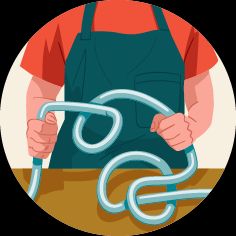Ulcerative colitis is a form of inflammatory bowel disease that typically causes gastrointestinal problems. However, UC can also cause back pain. This pain may happen because inflammation related to UC can spread to the joints, including the spine.
Ulcerative colitis (UC) is a form of inflammatory bowel disease (IBD) that affects approximately
While many people with UC experience digestive problems, people with this condition may also experience back pain. This is because inflammation related to UC can spread to the joints, including the spine.
Although back pain can be caused by UC, it’s important to remember that back pain can have many causes. If you have back pain that doesn’t go away or doesn’t get better with self-care measures, be sure to see your doctor so they can diagnose the cause and create a treatment plan that’s right for you.
Although UC is often associated with abdominal and rectal pain, it can cause pain outside the digestive system. If you have UC, the lower back is one area where you may feel pain.
Why does ulcerative colitis affect your back?
UC happens when the lining of your colon, rectum, or both, becomes inflamed. But in some cases, this inflammation can affect other parts of your body besides the digestive tract. For instance, inflammation from UC can impact your joints and lead to arthritis.
One type of arthritis that’s common in people with UC is axial spondyloarthritis. This condition, and a more severe type called ankylosing spondylitis, involve inflammation of the spine. Both of these conditions can frequently cause back pain.
Additionally, if you have UC, you may be
Other back pain causes
Although UC can cause back pain, there are also many other reasons why you may experience back pain. For instance, back pain may be caused by:
- strained muscles from lifting too much weight, not lifting an object correctly, or working out too hard
- sleeping in an uncomfortable position or on a mattress that doesn’t offer good back support
- sitting for an extended period of time, especially in a chair that doesn’t offer good back support
- standing or sitting with poor posture
- a herniated disk
- a spinal fracture
- sciatica, caused by an injury to the sciatic nerve
- being overweight
- endometriosis
- spinal stenosis
- an injury, such as falling, twisting your body too much, or a blow to the back
According to results presented at the 2019 American College of Rheumatology Annual Meeting, chronic axial back pain is seen in almost 25% of UC cases. Axial pain was more likely to occur in older people and after sleep or rest.
The researchers estimated that about 10% of IBD patients had axial spondyloarthritis but noted that they needed a larger sample size to be more accurate.
A hallmark of ankylosing spondylitis is sacroiliitis. In
More research with larger sample sizes is still needed to learn more about the connection between UC and conditions like axial spondyloarthritis and ankylosing spondylitis.
The treatment of back pain that’s caused by UC may depend on several factors, such as your age, level of pain, and severity of spinal inflammation.
Some treatment options may include:
- anti-inflammatory medications or injections
- other medications that can target the triggers of inflammation
- physical therapy to improve movement
- gentle movement and stretches
- dietary changes
- using a heat pack on painful areas
- surgery, in the most severe cases, and if no other treatment offers pain relief
If you have back pain that’s caused by UC, you may need to work with both a rheumatologist and a gastroenterologist. Treating UC-related digestive issues may help reduce inflammation and ease back pain.
Although ulcerative colitis (UC) primarily causes digestive issues, about 25% of people with UC also experience back pain due to inflammation in the digestive tract that can spread to the spine. Back pain related to UC is often linked to axial spondyloarthritis or ankylosing spondylitis.
If you have UC and experience back pain, be sure to talk with your doctor about your pain. They can work with you to develop a treatment plan to help ease or manage your back pain, whether it’s related to UC or not.

